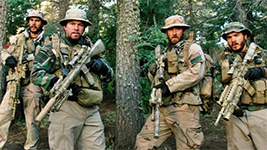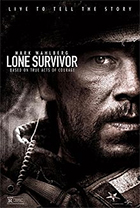Lone Survivor
|  Despite the fact that the title of Lone Survivor and its one-sheet prominently featuring the face of Mark Wahlberg to the exclusion of all other actors sap quite a bit of tension and impact from the film by making it clear from the outset that Wahlberg’s character, a Navy SEAL named Marcus Luttrell, is the only one who makes it to the final reel alive, Peter Berg’s muscular re-enactment of the failed 2005 Operation Red Wings still packs a punch. Set entirely in Afghanistan, the film, based on Luttrell’s memoir of the same name, spends only minimal time on set-up, focusing instead on the details of the mission and how it came to be that four Navy SEALs found themselves surrounded in Afghanistan’s Hindu Kush mountains by dozens of Taliban fighters. In this regard the film is very much the cousin of Ridley Scott’s Black Hawk Down (2001), which similarly depicted a disastrous military operation in Somalia with a gut-punch boots-on-the-ground sensibility. Despite the fact that the title of Lone Survivor and its one-sheet prominently featuring the face of Mark Wahlberg to the exclusion of all other actors sap quite a bit of tension and impact from the film by making it clear from the outset that Wahlberg’s character, a Navy SEAL named Marcus Luttrell, is the only one who makes it to the final reel alive, Peter Berg’s muscular re-enactment of the failed 2005 Operation Red Wings still packs a punch. Set entirely in Afghanistan, the film, based on Luttrell’s memoir of the same name, spends only minimal time on set-up, focusing instead on the details of the mission and how it came to be that four Navy SEALs found themselves surrounded in Afghanistan’s Hindu Kush mountains by dozens of Taliban fighters. In this regard the film is very much the cousin of Ridley Scott’s Black Hawk Down (2001), which similarly depicted a disastrous military operation in Somalia with a gut-punch boots-on-the-ground sensibility.As it turns out, Berg’s film is more romanticized, even though the ostensible purpose is to put us in the immediacy of modern guerilla warfare (his emphasis on visual realism is established during the opening credits, which unfold over actual video footage of Navy SEAL training). Berg, who wrote as well as directed, has a clear admiration for the men in uniform he is depicting, and Lone Survivor is nothing if not a deeply felt paean to their toughness, bravery, and, most importantly, humanity. Although there isn’t a great deal of character depth to the film, Berg spends enough time in the opening passages to give each of the film’s four protagonists a sense of presence and unique identity, even as he emphasizes their emotional similarities by prioritizing their connections with loved ones back home, whether they be wives, girlfriends, or fiancées. These may be tough, highly trained men capable of immense violence, but they are first and foremost human beings who are clearly fighting for something meaningful. The salty language and macho posturing is balanced with their picking out paint colors and debating wedding presents. However, once the action moves to the mountains as the men head toward a remote village to scout out the presence of a high-ranking Taliban leader, the film focuses in on the gritty recreation of an impossible situation. The four SEALs—team leader Michael Murphy (Taylor Kitsch), Danny Dietz (Emile Hirsch), Matt “Axe” Axelson (Ben Foster), and Wahlberg’s Luttrell—successfully locate the village and their target, but are just as quickly confronted with a perplexing ethical quandary: When they stumble across three goat herders, two of whom are little more than children, they are forced to make the difficult decision of whether to let them go and risk their giving up their location to the dozens of Taliban warriors in the village below or violate the rules of engagement and kill them, possibly staining their hands with innocent blood. The fact that they choose the former and within hours are surrounded by the Taliban contextualizes the ensuing violence with an emphasis on not just American might, but American right. They make the morally correct decision, but almost all end up paying for it with their lives. Berg has already had plenty of experience putting the military on film, whether it be in his button-pushing action-drama The Kingdom (2007), which followed a fictional FBI investigation of a terrorist attack on Americans in Saudi Arabi, or his last film, the silly board-game-to-action-spectacle adaptation Battleship (2012), which pitted most of the world’s naval forces against a massive alien invasion. He grounds Lone Survivor in a generally realistic aesthetic, although he can’t help but give in to melodramatic romanticism with each soldier’s death, laying on the poetic slow motion with an emphasis that is ultimately more distracting than laudable. The decency of the American soldiers makes their violent deaths all the more tragic, which is why Berg didn’t need to aestheticize them so much. Nevertheless, the film recovers nicely in its third act, when Wahlberg’s horrifically wounded character is taken in and given shelter by an Afghan named Gulab (Ali Suliman) who is opposed to Taliban rule and evokes a centuries-old ethic of protecting strangers to justify putting his entire village at risk to save Luttrell’s life. The fact that such an ethic will be all but unfathomable to most Americans makes it both a powerfully affirming corrective to the often cartoonish lens through which many Westerns view the supposed savagery of Middle Eastern cultures and an object lesson in what real humanity looks like. Copyright ©2014 James Kendrick Thoughts? E-mail James Kendrick All images copyright © Universal Pictures |
Overall Rating: 

 (3)
(3)


